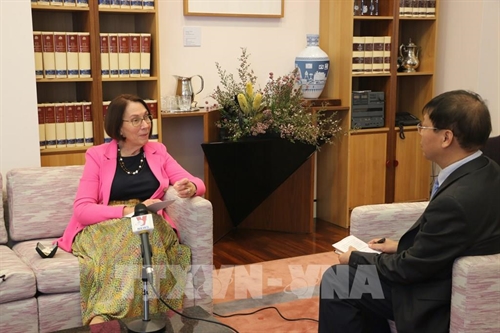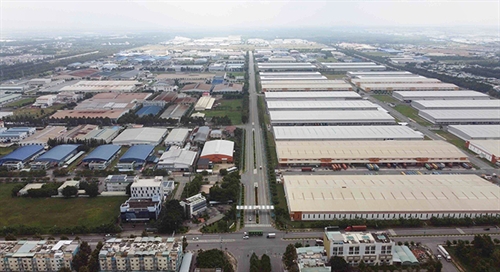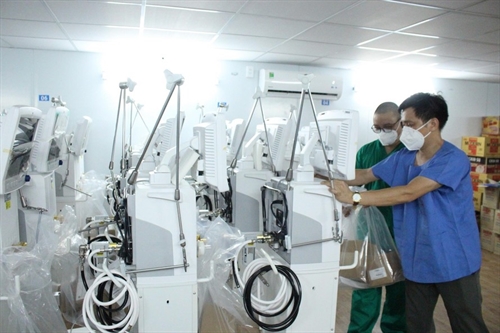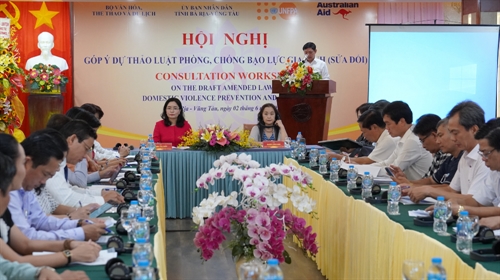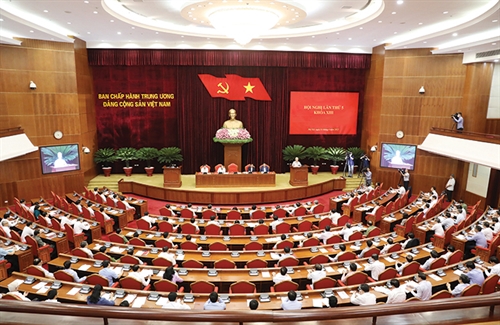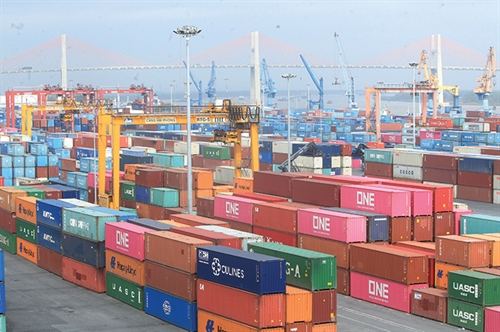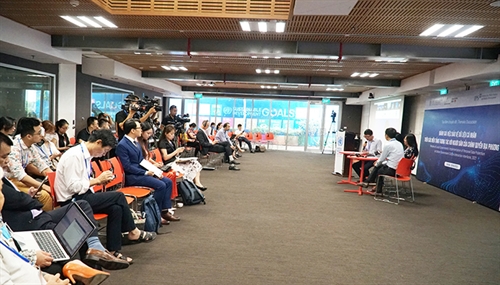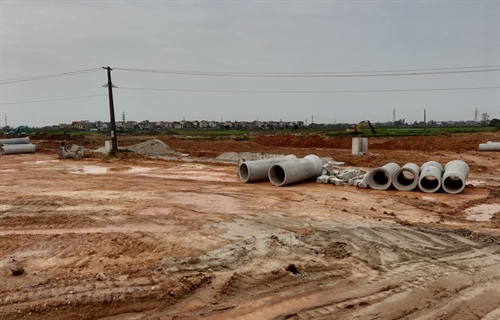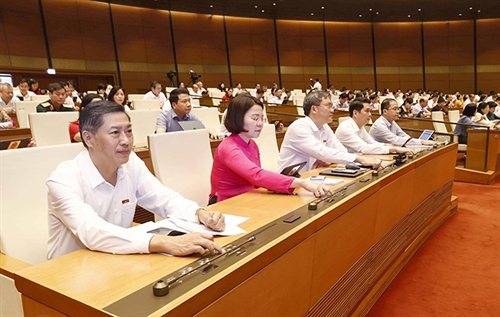After 21 days of sitting, the fourth session of the 15th National Assembly (NA) successfully completed its agenda, said NA Chairman Nguyen Dinh Hue at the closing session of the sitting on November 18.
According to Hue, during the fourth session, NA deputies passed six laws and adopted 13 resolutions. They also offered opinions on eight draft laws and decided on other important issues.
Socio-economic development goals set for 2023
The Resolution on the 2023 socio-economic development plan, which is one of the 13 resolutions adopted at the session, states the goals of prioritizing macro-economic stability, controlling inflation, promoting growth, and ensuring major balances of the economy.
It says that efforts must be focused on prevention and control of epidemics, formulation and improvement of legal institutions, raising of the effect and effectiveness of law implementation, assurance of discipline and order, combat against corruption, waste and negative practices, administrative reform, and improvement of the business investment environment.
The Resolution sets a GDP growth rate of some 6.5 percent and per-capita GDP of around USD 4,400. The processing and manufacturing industry is projected to contribute 25.4-25.85 percent of the GDP. Meanwhile, the average consumer price index growth rate is set at around 4.5 percent, and the labor productivity growth rate will be 5-6 percent.
In addition, the workforce in the agricultural sector will account for 26.2 percent of the total labor force while the rate of trained labor is expected to reach 68 percent.
It is also expected to keep the urban unemployment rate at below 4 percent and reduce the poverty rate by 1-1.5 percent.
There will be about 12 medical doctors and 32 patient beds per 10,000 people; health insurance will cover 93.2 percent of the population. The rate of communes reaching new-style countryside standards will be 78 percent. Municipal solid wastes will be collected and treated up to standards or technical regulations at the rate of 95 percent, while 92 percent of operating industrial parks and export processing zones will have wastewater treatment systems up to environmental standards.
According to the Resolution on the 2023 state budget estimates, from July 1 next year, the base salary for employees will be increased to VND 1.8 million per month.
At the same time, pensions and social insurance allowances for persons benefiting from the state budget will rise by 12.5 percent while additional support will be provided to those who had retired before 1995 with low benefit levels.
The standard allowance level for people with meritorious services to the revolution will be increased to be at least equal to the standard level applicable to poor households in urban areas while the expenditures for base salary-based social security policies will surge by 20.8 percent.
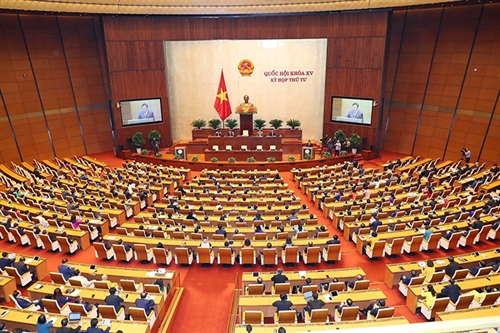 |
A plenary meeting of NA deputies during the fourth session of the 15th Legislature in Hanoi__Photo: Trong Duc/VNA |
| A plenary meeting of NA deputies during the fourth session of the 15th Legislature in Hanoi__Photo: Trong Duc/VNA |
Law on Exercise of Democracy at Grassroots Level adopted
At the session, lawmakers passed the Law on Exercise of Democracy at Grassroots Level, along with five others, namely the revised Petroleum Law, the revised Law on Domestic Violence Prevention and Control, the revised Inspection Law, the revised Law against Money Laundering, and the Law Amending a Number of Articles of the Law on Radio Frequencies.
According to NA Vice Chairman Nguyen Khac Dinh, the Law on Exercise of Democracy at Grassroots Level, the first of its kind so far, marks the 15th NA’s achievements in promptly constitutionalizing the 13th National Party Congress’s guidelines as well as orientations for the lawmaking program of the whole 15th tenure of the NA.
Hoang Thanh Tung, Chairman of the NA’s Committee on Legal Affairs, said that the Law on Exercise of Democracy at Grassroots Level focuses on the exercise of democracy in communes, wards, townships, state agencies, public non-business units and state enterprises.
Meanwhile, enterprises and organizations that employ workers under labor contracts in the non-state sector must comply with general provisions in Chapter I of the Law and refer to the labor law and other relevant laws regarding execution of democracy in the workplace.
The 91-article Law sets a principle saying that the implementation of democracy at labor-employing organizations must not affect production and business activities of such organizations.
The revised Law on Domestic Violence Prevention and Control, passed with more than 93 percent of votes in favor, will become effective on July 1 next year.
The revised Law, consisting of 56 articles, provides the prevention and stoppage of domestic violence, protection of and support for domestic violence victims, and handling of violations in domestic violence prevention and control. It also specifies conditions for securing domestic violence prevention and control; and state management of and responsibilities of related parties in domestic violence prevention and control.
It adds provisions to be applicable to foreigners residing in Vietnam, said Chairwoman of the NA’s Committee for Social Affairs Nguyen Thuy Anh.
Measures to protect and support domestic violence victims and handle violations have also been added to remediate shortcomings of the current law and meet the requirements of reality, she added.
The revised Law also encourages the mobilization of social resources for domestic violence prevention and control activities and heightens the State’s responsibility for allocating resources for these activities, aiming to build and ensure professional and effective operation of domestic violence victim support facilities.
In addition, the revised Law amended the provisions on responsibilities of the Government, state management agencies in charge of domestic violence prevention and control, and related entities for domestic violence prevention and control.
Draft laws put for debate
The eight bills tabled for discussion at the session include the draft Law on Civil Defense and draft revisions to the Law on Medical Examination and Treatment, Land Law, Law on Protection of Consumer Rights, Bidding Law, Law on Price, Law on e-Transactions, and Law on Cooperatives.
Regarding the draft Law on Medical Examination and Treatment (revised), NA deputies still hold divergent opinions on such issues as interpretation of terms, state policies and state management responsibilities on medical examination and treatment, socio-professional organizations engaged in medical examination and treatment, prohibited acts, the National Medical Council, forms of medical examination and treatment, and rights and responsibilities of health establishments, among others.
In Thuy Anh’s view, the draft law still fails to satisfactorily deal with the relationship among the State, the market and the society in medical examination and treatment activities as well as the financial autonomy mechanism applicable to public hospitals.
Oversight of thrift practice and waste combat
Presenting the Report of the NA’s Oversight Delegation on implementation of policies and laws on thrift practice and waste combat during 2016-21, Nguyen Phu Cuong, Chairman of the NA’s Finance and Budget Committee and Deputy Head of the NA’s Oversight Delegation, said important and positive results have been achieved in implementation of policies and laws on thrift practice and waste combat in the 2016-21 period, adding that authorities at all levels and in all sectors have issued their five-year and annual programs on thrift practice and waste combat.
Specifically, state budget funds and other state funds have been used in a more efficient manner with the total state budget revenue during 2016-20 accounting for 25.3 percent of GDP, 1.66 times the 2011-15 period’s figure. Positive changes have also been seen in the structure of state budget expenditures, with the ratio of expenditures for development investment in 2020 making up around 29 percent of total state budget expenditures. In addition, recurrent expenditures have gradually been reduced from 64.9 percent of total state budget expenditures in 2017 to below 64 percent in 2020.
Cuong went on to stress that by the end of 2021, the number of public non-business units has decreased by 13.85 percent, payroll of civil servants, 10.01 percent, and payroll of public employees, 11.12 percent, compared to the 2015’s figures.
The management and use of natural resources, land and minerals have been intensified. Many localities have drastically handled delayed projects and requested the putting into use of nearly 100,000 hectares of behind-schedule projects.
At the same time, through strengthened inspection, examination, auditing and investigation activities, many economic cases causing serious loss of state capital and assets have strictly been handled, thus helping limit corruption, waste and negative practices in resource management and use.
However, the Report also pointed out limitations and weaknesses in the implementation of policies and laws on thrift practice and waste combat, such as those in preparation and appraisal of state budget estimates; tax collection; progress of implementation of projects; and discipline in implementation of medium-term and annual public investment plans, etc.
To deal with the above shortcomings, the Report proposes the NA Standing Committee to include contents related to the implementation of policies and laws on thrift practice and waste combat in its annual oversight plans as well as in the 2023 specialized oversights of the use of funds of national target programs; investment and procurement in the health sector; and energy management, exploitation and use.
Regarding solutions to ensure effective use of human resources and avoid waste, NA deputy Pham Trong Nghia from Lang Son province suggested issuing the Vietnam Human Resource Development Strategy and Education Development Strategy for the 2021-30 period, the National Strategy for development of the pool of intellects for the 2021-30 period, and the Scheme on attraction and employment of talents up to 2030, with a vision toward 2045.
He also recommended formulating a mechanism serving as a bridge between the labor market and the education system to address skill supply-demand imbalance, along with solutions to increase labor productivity and raise the value of Vietnamese workers, step by step “saying no” to cheap labor. It is also necessary to formulate a strategy to attract overseas Vietnamese who are specialized in sciences and governance, he noted.
According to the Resolution of the fourth session, the NA has officially agreed to add information on place of birth into passports of citizens, following the rejection from a number of countries in the middle of this year to issue visas for Vietnamese passport holders.
In light of this, the Government is tasked to direct authorities to amend relevant legal documents, and study and submit amendment of Article 6.3 of the Law on Exit and Entry of Vietnamese Citizens to the NA for consideration and decision in order to meet practical requirements.
Under the Resolution, the statute of limitations for disciplining violating cadres, civil servants or public employees subject to reprimand will be extended to five years, while persons subject to caution or severer penalties will have such statute of limitations extended to 10 years.
According to Minister of Home Affairs Pham Thi Thanh Tra, the statute of limitations for disciplining violators applicable in the Party and that for administrative disciplining for cadres, civil servants and public employees remain inconsistent, thus affecting the implementation of the Party Central Committee’s Regulation 69 of 2022 on disciplining of violating Party organizations and members.
